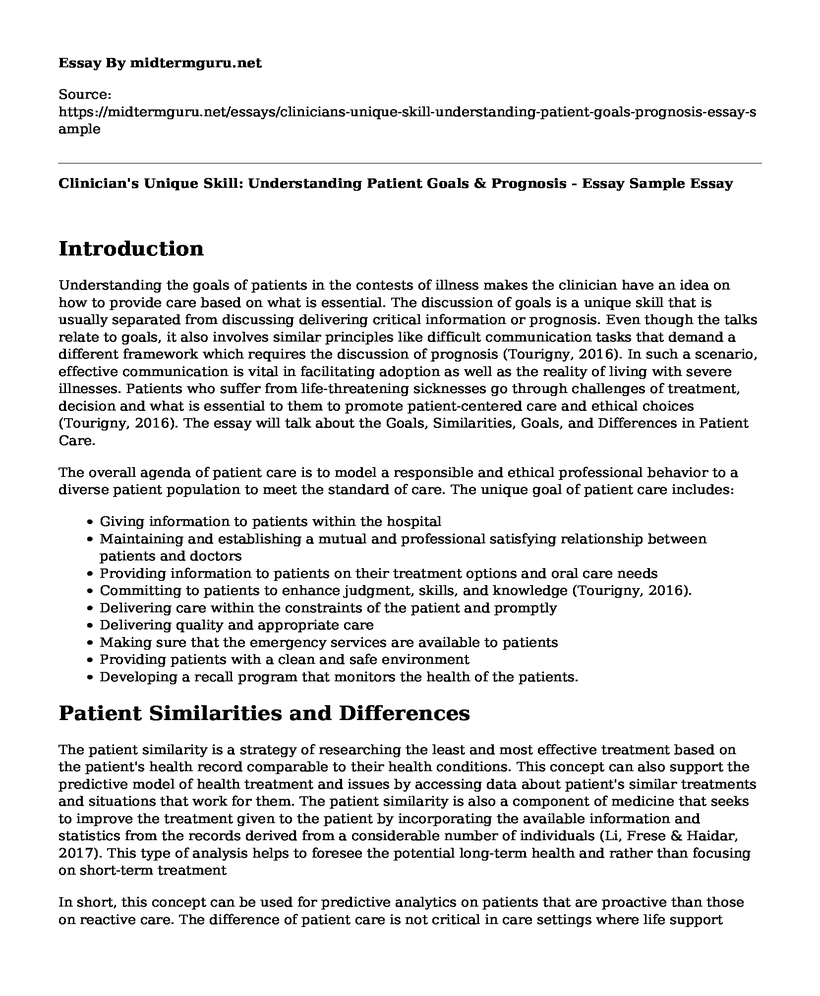Introduction
Understanding the goals of patients in the contests of illness makes the clinician have an idea on how to provide care based on what is essential. The discussion of goals is a unique skill that is usually separated from discussing delivering critical information or prognosis. Even though the talks relate to goals, it also involves similar principles like difficult communication tasks that demand a different framework which requires the discussion of prognosis (Tourigny, 2016). In such a scenario, effective communication is vital in facilitating adoption as well as the reality of living with severe illnesses. Patients who suffer from life-threatening sicknesses go through challenges of treatment, decision and what is essential to them to promote patient-centered care and ethical choices (Tourigny, 2016). The essay will talk about the Goals, Similarities, Goals, and Differences in Patient Care.
The overall agenda of patient care is to model a responsible and ethical professional behavior to a diverse patient population to meet the standard of care. The unique goal of patient care includes:
- Giving information to patients within the hospital
- Maintaining and establishing a mutual and professional satisfying relationship between patients and doctors
- Providing information to patients on their treatment options and oral care needs
- Committing to patients to enhance judgment, skills, and knowledge (Tourigny, 2016).
- Delivering care within the constraints of the patient and promptly
- Delivering quality and appropriate care
- Making sure that the emergency services are available to patients
- Providing patients with a clean and safe environment
- Developing a recall program that monitors the health of the patients.
Patient Similarities and Differences
The patient similarity is a strategy of researching the least and most effective treatment based on the patient's health record comparable to their health conditions. This concept can also support the predictive model of health treatment and issues by accessing data about patient's similar treatments and situations that work for them. The patient similarity is also a component of medicine that seeks to improve the treatment given to the patient by incorporating the available information and statistics from the records derived from a considerable number of individuals (Li, Frese & Haidar, 2017). This type of analysis helps to foresee the potential long-term health and rather than focusing on short-term treatment
In short, this concept can be used for predictive analytics on patients that are proactive than those on reactive care. The difference of patient care is not critical in care settings where life support outcome is expected to change because of the patient's progress on incurable illnesses (Li, Frese & Haidar, 2017). Therefore, the difference in patient care may signal unresolved disagreement or conflict between the patient, family members and the clinical team on the ongoing treatment. In this context it is clear that disputes usually bring differences in patient's expectations about the likely hood of disagreements or positive outcome in opinion and what counts as situations or positive since therapy is deemed potentially futile or inappropriate.
Conclusion
When framed amidst, the discussion of patient goals can be interpreted in the suggestions when the patient does not understand, or the family is complicated. Therefore, caution is set when using the patient care because it is a critical component when it comes to a decision making especially in the midst of serious not just because there is a conflict or disagreement but because of the appropriateness of the family and patient choices.
References
Li, W.-D., Frese, M., & Haidar, S. (2017). Distinguishing Proactivity from Citizenship Behavior: Similarities and Differences. Oxford Handbooks Online, 3(2), 70-86. DOI: 10.1093/oxfordhb/9780190219000.013.36
Tourigny, L. (2016). Nursing and Patient Care. Journal of Nursing & Patient Care, 01(01), 48-92. DOI: 10.4172/2573-4571.1000e101
Cite this page
Clinician's Unique Skill: Understanding Patient Goals & Prognosis - Essay Sample. (2023, Feb 09). Retrieved from https://midtermguru.com/essays/clinicians-unique-skill-understanding-patient-goals-prognosis-essay-sample
If you are the original author of this essay and no longer wish to have it published on the midtermguru.com website, please click below to request its removal:
- My Greatest Crucible
- Health Assessment of on the Example of Jamal's Family - Paper Example
- Breaking the Taboo Essay Example
- Paper Example on Profession and School Counseling
- Essay Sample on Today's Exhausted Superkids
- Memory, Learning, Creativity and Intelligence Interrelation - Essay Sample
- Bob Selling Unapproved Drugs to US Consumers: Potential Harms - Essay Sample







